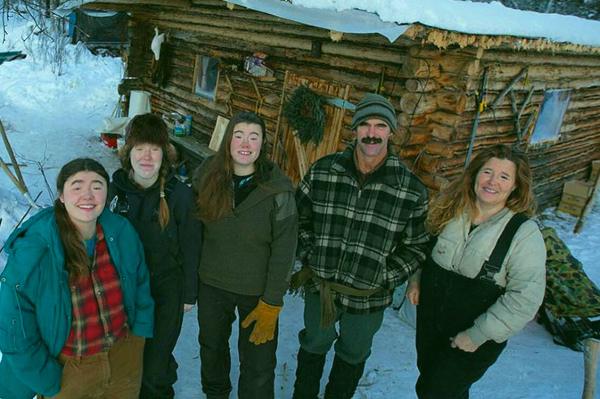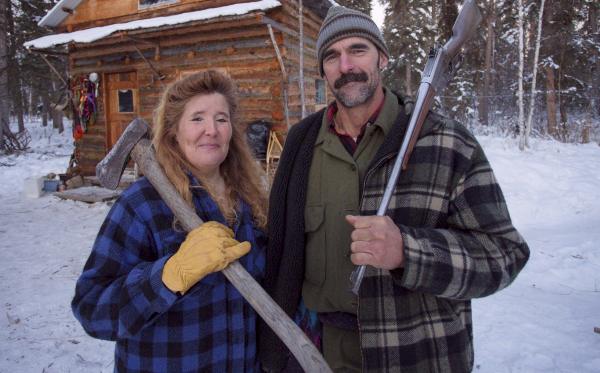When the US government banned human occupation in the Alaskan refuge, the people were forced to make a decision. To either leave the refuse and relocate or move to cabins. While many chose to head away in search of better opportunities, few decided to remain. And over the years, few people have migrated back to Alaska in search of that tranquil life away from the grid. But life in Alaska is not as easy as it seems. Everything from the climate to the jungles, seems to be against you. But be in one with nature and you find yourself succeeding. This is also one of the major take-outs of the reality TV series, The Last Alaskans. The Lewis family was one of them. For two seasons, they captivated viewers with their adventures and challenges in the Arctic National Wildlife Refuge, a vast and pristine wilderness in Alaska. But then, they disappeared from the show without a trace. What happened to the Lewis family from The Last Alaskans? Where are they now? And why did they leave the refuge that they loved so much? In this article, we will reveal the surprising truth behind their departure, and catch up with their current lives.
Meet the Last Alaskans
Living in the Arctic National Wildlife Refuge, one of the most remote and pristine regions in the world, are some of the most isolated people in America. They are the last Alaskans, the subjects of a documentary series that showcases their courage, wisdom, and spirit. The series features four families who have chosen to live off the land, hunting, fishing, and trapping for their survival. They are:
- Bob Harte, who spent 40 years in the Alaskan wilderness as a veteran of the refuge. He was known for his humor, resilience, and love for his family and friends. He passed away in 2017 after a long battle with cancer.
- Heimo and Edna Korth, one of the rare permanent residents of the refuge who have lived there for over four decades. Heimo is a master of survival skills and a mentor to young people who want to learn the traditional ways of life.
- Tyler and Ashley Selden, a young couple who met in college and decided to pursue their dream of living in the wilderness. They are passionate about preserving the natural environment and respecting the wildlife.
- Ray and Cindy Lewis

Who are the Lewis Family?
The Lewis family consists of Ray Lewis, his wife Cindy Lewis, and their three daughters Molly, Emma, and Sarah. Both Ray and Cindy are Alaskan natives who grew up in the wilderness and learned how to survive in the harsh environment. Ray is originally from Michigan born in October 1961, but he moved to Alaska in 1983 and since never looked back. Cindy who is originally from Port Huron was born with a rare genetic condition called blepharophimosis, ptosis, epicanthus inversus (BPEI) syndrome, which affects the shape and size of her eyes. She passed on this condition to her daughters, who also have droopy eyelids and narrow eye openings.
The Lewis family has been living in the Arctic National Wildlife Refuge for over 30 years, making them one of the few families who are legally allowed to reside there. The refuge is a vast and remote area that covers 19 million acres of land and is home to a variety of wildlife species. The Lewis family lives in a cabin that they built themselves, and they rely on hunting, trapping, fishing, and gathering for their food and income. They also have a strong bond with each other and enjoy spending time together as a family.
What happened? Why did they leave The Last Alaskans?
From the very first episode of The Last Alaskans, the Lewis family captured the hearts of the viewers. The series premiered on May 25, 2015, with the episode No Man’s Land, which introduced the adventurous and authentic lifestyle of Ray, Cindy, and their three daughters. The fans loved the warm and friendly personalities of the Lewis family, as well as the strict yet kind attitude of Ray. The series followed their journey of learning how to survive and thrive in the Alaskan wilderness.

The Lewis family had some memorable moments on the show, such as Ray building his own houseboat, Molly becoming a wilderness guide, Emma training sled dogs, and Sarah learning how to hunt. After making regular appearances in the first and second seasons, the Lewis family was nowhere to be seen during the third season. This left fans concerned and fearing for the worst. Discovery confirmed their fears by later announcing that Ray and his family had been cut off from the show. The channel also came out with an explanation. During the previous seasons of the series, it was shown that Ray was passionate about houseboats. When the second series wrapped up, he completed the boat he was working on and took the family across Alaskan waters. As Ray started to spend more time on the sea than on land, it became a nuisance for producers to include them in the series. Also, since Ray was no longer living in the Alaskan refuge, he didn’t match the context of the show. As a result, the Lewis family was let go from the series.
Where is the Lewis family now?
Ray and Cindy Lewis have chosen a different lifestyle from the rest of their family. While their relatives still reside in various parts of Alaska, they have moved to their houseboat permanently. They love sailing across the waters of Alaska, discovering new sights and living adventurously. Sometimes, they go back to their cabin in the refuge for a change of scenery, but their boat is their true home.
Sarah, the youngest of three daughters, still lives with her parents on their boat. Her older sisters, Molly and Emma, have left home to pursue their own careers. According to her Facebook page, Molly is married and lives in Fairbanks, Alaska. She worked as a Counselor and Riding Instructor at Camp Li-Wa, and also as a wilderness guide in Oregon for Eagle Cap Wilderness Outfitters, where she led hiking and camping trips.
Emma, the middle daughter, trains sled dogs in Alaska with Charlie and Joanna Jagow and plans to join the Yukon Quest 300 race – a grueling 300-mile course that is the world’s coldest.
Conclusion
The Lewis family is an inspiring example of a family that has embraced nature and adventure as a way of life. They have shown us that living in harmony with the environment and each other is possible and rewarding. They have also shown us that change is inevitable and that we should always be ready to adapt and grow. We wish them all the best in their endeavors and hope to see them again someday on The Last Alaskans.
ncG1vNJzZmismJqwprjEm6qippake6S7zGijnq%2BZqHqnrcyio7JlnqTEcA%3D%3D